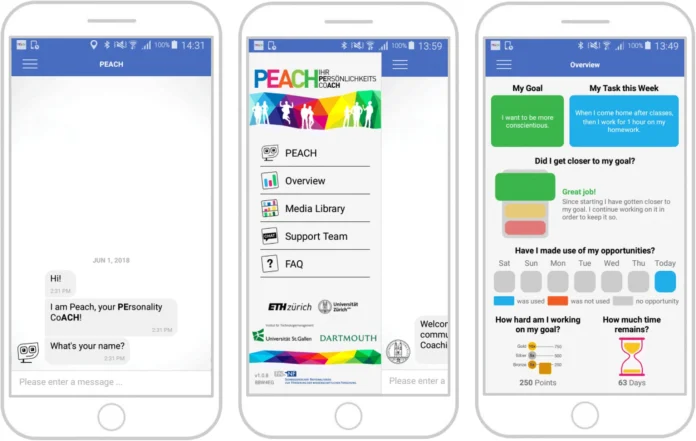Excerpt:
Research Goals and Hypotheses
The first goal of the present study is to examine the effectiveness of PEACH, a smartphone- and conversational agent-based coaching intervention for intentional personality change. The outcome research hypothesis is that two experimental conditions (high versus low self-aware conversational agent) will be more effective with respect to personality trait change in comparison to the two waiting list conditions. Furthermore, based on previous work on the effects of anthropomorphized computer-mediated communication on human behavior [57], the differential outcome research hypothesis is that the self-aware conversational agent will be more effective in terms of relationship-building, promoting intervention adherence and thus treatment success than the low self-aware conversational agent.
The second goal is to explore underlying processes and mechanisms that improve the outcomes of the intervention. Two approaches are used for process assessments: self-reports and smartphone sensing. Both methods include an intensive longitudinal design. This allows exploring associations between actively (self-reports) and passively (sensors) assessed intervention processes.
Methods/Design
Design
In this study protocol, we describe a 2×2 factorial between-subject randomized, wait-list controlled trial with intensive longitudinal methods studying the effectiveness of a 10-week smartphone- and conversational agent-based coaching intervention for intentional personality change. The effectiveness of the intervention will be compared across two dimensions: intervention (experimental versus wait-list control) and conversational agent design (high versus low self-awareness). Participants will be randomly assigned to one of four conditions: (a) experimental condition 1: conversational agent with high self-awareness, (b) experimental condition 2: conversational agent with low self-awareness, (c) wait-list condition 1: conversational agent with high self-awareness, (d) wait-list condition 2: conversational agent with low self-awareness. Participants in the wait-list control conditions will receive no intervention for the first four weeks to document the natural course of their personality change without expecting interventional effects. To monitor progress, the wait-list control groups will respond to the same weekly questionnaires during those four weeks as the subjects from the experimental conditions. Additionally, they are passively tracked by smartphone sensors. After the four weeks without any intervention, subjects of the wait-list control conditions will receive the same intervention as subjects of the experimental conditions – depending on their conversational agent embedding high or low self-awareness cues.
Relevance:
This article discusses the PEACH app, a smartphone-based intervention featuring a conversational agent aimed at fostering intentional personality change. It investigates whether a highly self-aware agent is more effective in enhancing outcomes like relationship-building and adherence than a less self-aware agent. Several insights can be drawn from this study. For example, it highlights the potential of smartphone apps with AI-driven conversational agents in promoting personality change, demonstrating how different levels of self-awareness in AI agents can significantly impact user engagement and the overall effectiveness of the intervention. Additionally, the article provides valuable lessons on designing experiments using a factorial model, which allows for comparing various intervention types and control groups to draw more precise conclusions. These insights are relevant to my capstone project, as it might also focus on UI/UX design and the creative integration of AI, considering how such elements can enhance user experience and effectiveness of the application.
Reference:
Stieger, M., Flückiger, C., Rüegger, D., Wepfer, S., & Allemand, M. (2018). PEACH, a smartphone- and conversational agent-based coaching intervention for intentional personality change: Study protocol of a randomized, wait-list controlled trial. BMC Psychology, 6(1), 43. https://doi.org/10.1186/s40359-018-0257-9




